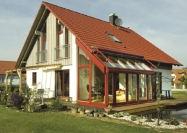New German building rules
From 1st October ’09 builders and owners need to meet new standards in house insulation and energy efficient heating.
The intent of the regulations is to meet German requirements to reduce CO2 requirements by 40%, from 1990 levels to 2020. For new construction the new regulations reduce average energy consumption by 30%. Efficiency requirements for insulation of the building envelope will be raised by 15%, compared to the previous requirements.
For existing buildings similar requirements apply for major alterations. In addition owners have until 2011 to provide insulation to any usable floors located below an uninsulated roof space.
All of this is contained in regulations named EnEV 2009 (this link is to the full text in German). They are backed by a system of inspections and certificates, so that owners and tenants can be assured that the regulations have been implemented.
To meet the 2020 targets additional tightening of the rules, by about the same amount, will happen in 2012. Builders are already encouraged to take the next step. A house built to the current regs (admin comment: tight in comparison to the US) will likely be labeled an “energy hog” in just three years.
The information above is from an article in the “Süddeutsche Zeitung” of Aug 26 ’09.

(The planned 2012 standard is close to “KfW 40” – see link for further explanation. There is a partial English translation. The term KfW 40 means heating usage of 40kWh/m2/year, which is also roughly equal to a “4 liter house”, i.e. using 4 liters of heating oil/m2/year)
Posted: October 14th, 2009 under Uncategorized.

Leave a Reply
You must be logged in to post a comment.